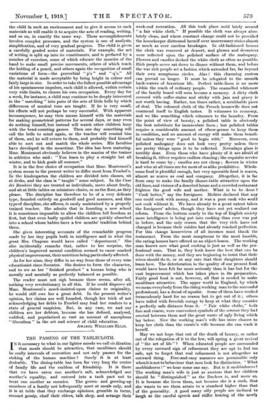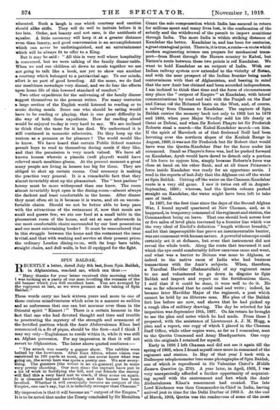THE PASSING OF THE TABLECLOTH.
IS it necessary to what in our lighter moods we call civilization that meals should be attractive, that mealtimes should be really intervals of recreation and not only pauses for the stoking of the human machine ? Surely it is at least desirable. The dining-table has been for very long the centre of family life and the emblem of friendship. It is there that we have eaten one another's salt, acknowledged one another's equality, and entered into a tacit pact not to treat one another as enemies. The grownand growing-up members of a family not infrequently meet at meals only, and it is at table that they exchange opinions, grumble in turns, recount gossip, chaff their elders, talk shop, and arrange their week-end recreation. All this took place until lately around " a fair white cloth." If possible the cloth was always absolutely clean, and where constant change could not be provided the housekeeper distressed herself over unnecessary stains almost as much as over careless breakages. In old-fashioned houses the cloth was removed at dessert, and glasses and decanters were reflected upon the polished surface of the mahogany. Flowers and candles decked the white cloth as often as possible. Rich people never sat down to dinner without them, and before the war rich people set a fashion which extended far, far beyond their own sumptuous circles. Alas ! this charming custom can prevail no longer. It must be relegated to the smooth back-waters of luxurious life. Perfect table-linen is no more within the reach of ordinary people. The enamelled whiteness of the family board will soon become a memory. A dirty cloth covered with coffee-stains and sticky with jam and gravy is not worth having. Rather, ten times rather, a scrubbable piece of deal. The coloured cloth of the French housewife does not commend itself to English tastes. It witnesses to economy, and we like something which witnesses to the laundry. From the point of view of beauty, a polished table is obviously the best substitute for immaculate linen ; but polished tables require a considerable amount of elbow-grease to keep them in condition, and no amount of energy will make them beautiful unless they were " good to begin with." Moreover, even polished mahogany does not look very pretty unless there are pretty things upon it to be reflected. Nowadays glass is terribly dear. Even those who have plenty of it are afraid of breaking it. Silver requires endless cleaning; the requisite service is hard to come by ; candles are not cheap ; flowers in winter and wine at all times are for most of us alike prohibitive. Wholesome food is plentiful enough, but very agreeable food is scarce, almost as scarce as coal and company. Altogether, it is far from easy to make the family dinner-table attractive upon the old lines, and visions of a deserted house and a crowded restaurant frighten the good wife and mother. What is to be done ? " Cook better," say the foreigners. Moliere declared that any one could cook with money, and it was a poor cook who mould not cook without it. We have already to a great extent taken the foreigners' advice, though they have not yet realized our reform. From the bottom nearly to the top of English society more intelligence is being put into cooking than ever was put in before, and the only reason that the very rich have not changed is because their cuisine had already reached perfection, For this change housewives of all incomes must thank the restaurant. From the most sumptuous to the most humble, the eating-houses have offered us an object-lesson. The working man knows now what good cooking is just as well as the professional man. That is, they both know the best that can be done with the money, and they are beginning to insist that their wives should do it, or at any rate that their daughters should learn how. The deterioration in the quality of our present food would have been felt far more seriously than it has but for the vast improvement which has taken place in its preparation. Fairly good food is not, however, all that is needed to make mealtimes attractive. The upper world in England, by which we mean everybody from the rising working man to the successful professional, has a dread of squalor. Some of them have worked tremendously hard for no reason but to get out of it ; others have toiled with feverish energy to keep at what they consider a perfectly safe distance from it. " Fair white cloths," both fine and coarse, were convenient symbols of the screens they had erected between them and the great waste of ugly living which lay below. Now the working man's wife has more chance to keep her cloth than the curate's wife because she can wash it herself.
May we not hope that out of the death of luxury, or rather out of the relegation of it to the few, will spring a great revival of " the art of life" ? When educated people are surrounded by every outward sign of refinement they are apt to feel too safe, apt to forget that real refinement is not altogether an outward thing. Free-and-easy manners are permissible only when it is not to behaviour that men look for distinction. " What snobbishness !" we hear some one say. But is it snobbishness ? The working man's wife is just as anxious that her children should be " distinguished " as the Duchess is, and more so. It is because she loves them, not because she is a snob, that she wants to see them attain to a standard higher than that of the generality. A good many silly people are inclined to laugh at the careful speech and stiffer bearing of the newt'
educated. Such a laugh is one which courtesy and caution should alike stifle. They will do well to imitate before it is too late. Order, not beauty and not ease, is the antithesis of squalor. A little ceremony will keep it at a greater distance even than luxury, and good conversation is an accomplishment which can never be undistinguished, and an entertainment which will be always fit to offer to a King.
But it may be said : " All this is very well where hospitality is concerned, but we were talking of the family dinner-table. When we and our children sit down to meals together we are not going to talk like a book, nor yet to show one another a courtesy which belonged to a patriarchal age. To our minds, effort is no part of good breeding. All the same, we do find our mealtimes nowadays very dismal, and we do fear the effects upon home life of this lowered standard of comfort."
Two other expedients for the enlivening of the family dinner suggest themselves to the present writer. For many centuries a large section of the English world listened to reading or to music during meals. Some one who should be eating would have to be reading or playing, that is one great difficulty in the way of both these expedients. How far reading aloud would be enjoyed to:day is very hard to say. We are inclined to think that the taste for it has died. We understand it is still continued in monastic refectories. Do they keep up the custom as a penance or for pleasure ? The world would like to know. We have heard that certain Public School masters permit boys to read to themselves during meals if they like, and that the permission is very much valued. We have all known houses wherein a pianola (well played) would have relieved much mealtime gloom. At the present moment a great many people are living in houses too big for them. They are obliged to shut up certain rooms. Coal economy is making the practice very general. It is a remarkable fact that they almost invariably shut up the pleasantest. The " best parlour " heresy must be more widespread than one knew. The room almost invariably kept open is the dining-room—almost always the darkest and least comfortable in the house. After dinner they must often sit in it because it is warm, and sit on uncomfortable chairs. Should we not be better able to keep pace with the attractions of the restaurant if, now that meals are small and guests few, we ate our food at a small table in the pleasantest room of the house, and sat at ease afterwards in our most comfortable chairs surrounded by our best possessions and our most entertaining books ? It must be remembered that in this struggle between the home and the restaurant the issue is vital, and that with washing and service at their present prices the ordinary London dining-room, with its huge bare table, straight chairs, and dull walls, is but ill equipped for the fight.







































 Previous page
Previous page